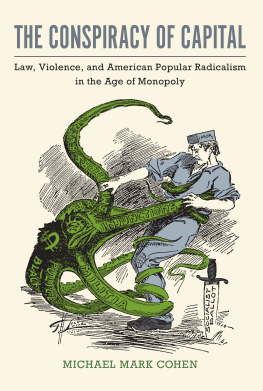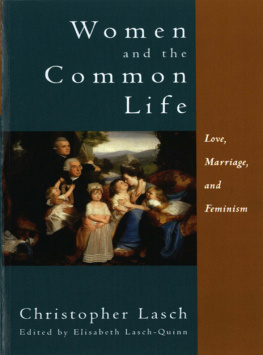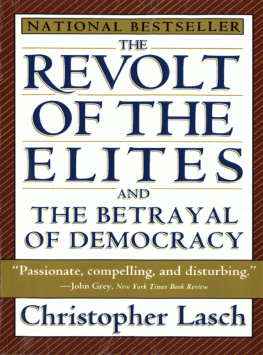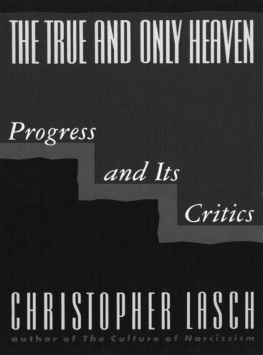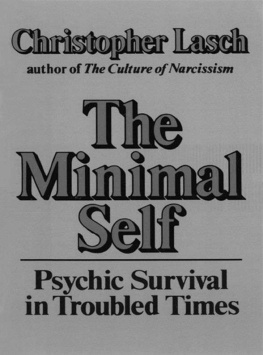Christopher Lasch. - The agony of the american left
Here you can read online Christopher Lasch. - The agony of the american left full text of the book (entire story) in english for free. Download pdf and epub, get meaning, cover and reviews about this ebook. City: New York, year: 2013., publisher: Knopf, genre: Politics. Description of the work, (preface) as well as reviews are available. Best literature library LitArk.com created for fans of good reading and offers a wide selection of genres:
Romance novel
Science fiction
Adventure
Detective
Science
History
Home and family
Prose
Art
Politics
Computer
Non-fiction
Religion
Business
Children
Humor
Choose a favorite category and find really read worthwhile books. Enjoy immersion in the world of imagination, feel the emotions of the characters or learn something new for yourself, make an fascinating discovery.

- Book:The agony of the american left
- Author:
- Publisher:Knopf
- Genre:
- Year:2013.
- City:New York
- Rating:3 / 5
- Favourites:Add to favourites
- Your mark:
- 60
- 1
- 2
- 3
- 4
- 5
The agony of the american left: summary, description and annotation
We offer to read an annotation, description, summary or preface (depends on what the author of the book "The agony of the american left" wrote himself). If you haven't found the necessary information about the book — write in the comments, we will try to find it.
The agony of the american left — read online for free the complete book (whole text) full work
Below is the text of the book, divided by pages. System saving the place of the last page read, allows you to conveniently read the book "The agony of the american left" online for free, without having to search again every time where you left off. Put a bookmark, and you can go to the page where you finished reading at any time.
Font size:
Interval:
Bookmark:
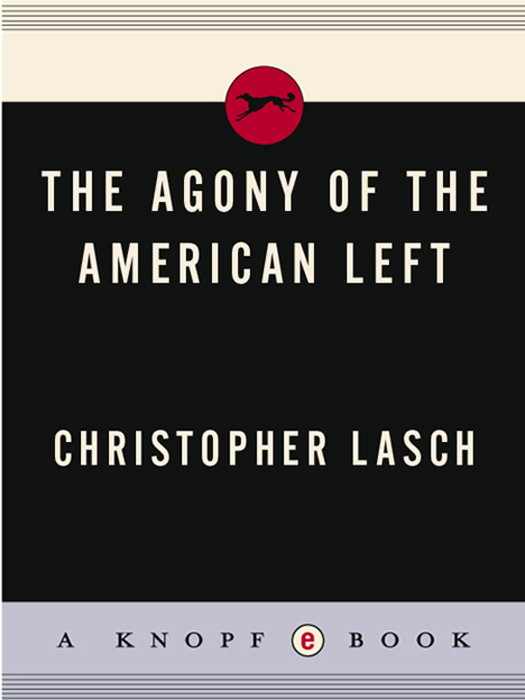
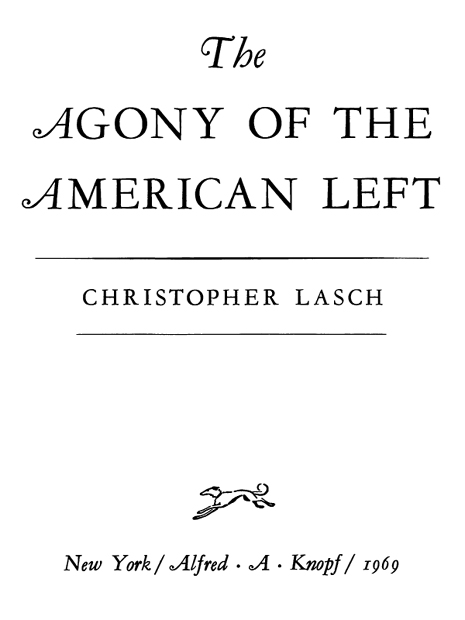

Library of Congress Catalog Card Number: 69-10708
THIS IS A BORZOI BOOK
PUBLISHED BY ALFRED A. KNOPF, INC.
Copyright 1966, 1967, 1968 by CHRISTOPHER LASCH . All rights reserved under International and Pan-American Copyright Conventions. Published in the United States by Alfred A. Knopf, Inc., New York, and simultaneously in Canada by Random House of Canada Limited, Toronto. Distributed by Random House, Inc., New York.
The Decline of Populism originally appeared in slightly different form in Katallagete, Journal of the Committee of Southern Churchmen.
The Collapse of Socialism and the Isolation of the Intellectuals, Black Power: Cultural Nationalism as Politics, and The Revival of Political Controversy in the Sixties originally appeared in slightly different form in The New York Review of Books.
The Cultural Cold War: A Short History of the Congress for Cultural Freedom originally appeared in slightly different form in The Nation.
eISBN: 978-0-307-83050-0
v3.1
Other Books by
CHRISTOPHER LASCH
The American Liberals and the Russian Revolution
[1962]
The New Radicalism in America
[1965]
TO
ROBBY
We now have the abnormal situation that, in the face of the extraordinary novelties and complexities of modern times, there is no persuasive program for social reconstruction, thought up by many minds, corrected by endless criticism, made practical by much political activity. The young are honorable and see the problems, but they dont know anything because we have not taught them anything.
Paul Goodman, The New York Times Magazine,
February 25, 1968
W HAT EXPLAINS THIS ABNORMAL SITUATION ? WHY do we find ourselves, in an unprecedented crisis in our history, without a program for change?
Goodman attributes this condition to the failure of the intellectuals during the late forties and fifties, who allowed themselves to be co-opted by the C.I.A., the Rand Corporation, [and] the universities, in which they were kept busy, were able to esteem themselves as in the swim and thereby did not devote themselves to their normal businessto create new programs for the future.
It is true that the defection of intellectuals in the periodjust past is the immediate source of our troubles. In one of the following essays, The Cultural Cold War, I have analyzed this defection from the point of view of one who came intellectually of age in the fifties, when the official realism was the dominant ideology. My experience and the experience of many of my friends and contemporaries fully bears out the contention that the intellectuals acquiescence in the premises of the cold war made it unusually difficult to get a political education in the fifties.
The deeper explanation of the present crisis of radicalism, however, lies in events that happened in the early part of this century. It lies in the collapse of mass-based radical movements which grew for a time and then aborted: populism, socialism, and black nationalism. The essays in this book deal with the promising beginnings made by those movements, with the reasons for their failure, and with the consequences of that failure.
Those who wish to change America must now pick up the thread of radical thought and action where it was broken, not in the thirties and forties, but in an even more distant period. The men of that time speak to us across intervening generations of silence, and it is often hard to understand what they are saying. Moreover modern history unfolds so rapidly that the distance between generations is more than normally wide. Many young people today see no use in the past, perhaps because the immediate past has had so little to teach them. The history of American radicalism, in any case, is largely a history of failure and therefore not a source of comfort to those who look to the past to find ancestors and heroes. All that we find in the past of American radicalism are ordinary men and women struggling with questions which the best of them realized were too difficult to resolve but which nevertheless seemed to demand a continuing effort to resolve them. Radicalism in the United States has nogreat triumphs to record; but the sooner we begin to understand why this should be so, the sooner we will be able to change it.
Three editors, James Y. Holloway of Katallagete, Carey McWilliams of The Nation, and Robert Silvers of the New York Review of Books, gave me invaluable advice and assistance in the writing of one or the other of these essays. I thank them all. Bob Silvers in particular has been a generous and exacting critic, and although I have not found it easy even to approximate his standards, I am grateful to him for insisting on them.
I should also like to acknowledge once again my obligation to Harold Cruses The Crisis of the Negro Intellectual, which has been an indispensable guide through the complexities of American cultural history. Although this work continues to be deliberately ignored by reviewers, it will eventually come to be regarded as one of the landmarks of social criticism in the twentieth century.
These young intellectuals are the victims of historical discontinuity. As a result, this new generation is called upon to make up for lost timeabout forty-five years of it.
Harold Cruse, The Crisis of the Negro Intellectual
OF POPULISM
left behind in decaying cities from which earlier proletarians, together with the industries that employed them, had fled.
During the urban-industrial period of capitalist development, by contrast, poverty was a pervasive rather than a marginal experience: it immediately affected the lives of masses of people and played a central part in the consciousness of the period. Repeated and regular cycles of boom and depression throughout the industrial age left millions destitute. The depressions of the 1870s and 1890s, no less than the Great Depression of the 1930s, were major cataclysms, while the economic recession of 1911 might well have deepened into another full-scale depression if war preparations in 1914 had not acted as an artificial stimulant. These upheavals fell with terrible weight on those directly involved in the industrial enterpriseon the industrial workerswhereas in our own time poverty has been eliminated from the sphere of American society dominated by large corporations and falls on precisely those whom the system has not assimilated: migrant and seasonal workers, the chronically unemployed, and workers in the shops of petty capitalism.
In postindustrial society resistance to the existing order comes from these groups and from university students, who for very different reasons have a marginal relationship to
Socialism was consciously revolutionary and conceivedof the solution to the social question as the overthrow (not necessarily violent) of the bourgeoisie by the working class. The populists were by no means a reactionary movement of the petit-bourgeoisie, as the Socialist Laborite Daniel DeLeon maintained, but their ideas derived not from Marx but from the physiocratic tradition and from the democracy of Jefferson, Jackson, and Lincoln. The populists, like the socialists, believed that the producing classes should enjoy the fruits of their toil, that the interests had appropriated the wealth that rightly belonged to the people, and that the masses should organize in their own defense; but the vagueness of this terminology, compared with the relative precision of the socialist vocabulary, betrayed basic differences of outlook. It was not simply that populists, in theory at least, tended to identify production with agriculture and to see land as the ultimate source of wealth. Socialists maintained that not only industrialization but the concentration of industrial production were historically progressive developments leading to the collectivization of production. Populists, on the other hand, regarded them with loathing, as leading to bureaucracy, the fragmentation of experience, and the tyranny of organizations.
Font size:
Interval:
Bookmark:
Similar books «The agony of the american left»
Look at similar books to The agony of the american left. We have selected literature similar in name and meaning in the hope of providing readers with more options to find new, interesting, not yet read works.
Discussion, reviews of the book The agony of the american left and just readers' own opinions. Leave your comments, write what you think about the work, its meaning or the main characters. Specify what exactly you liked and what you didn't like, and why you think so.


